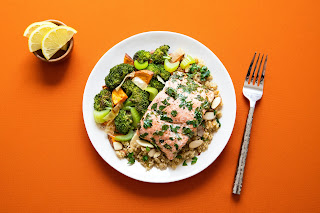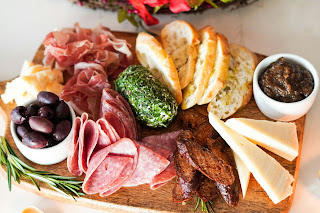Do you need to eat 6 meals a day to lose weight? Nutrition myths BUSTED, part 11
I thought it was time to get back to busting some nutrition myths. There is always something circling about what, when, or how to eat. They’re also often far from the truth. In this edition of busting nutrition myths, I’m going to be debunking:
- You need to eat 6 small meals a day to lose weight
- Eating past 6pm is bad
- Eating healthily is expensive
Let’s jump right in…
You need to eat 6 small meals a day to lose weight – MYTH
Weight loss is always a trending topic, and someone is
always trying to sell a technique that will help with weight loss. The myth
that eating 6 small meals helps with weight loss comes from the idea that every
time you eat your metabolism increases.
Your metabolism is all the chemical reactions that occur in
your body every day. This includes reactions such as the creation of muscle from proteins.
But in the context of this myth, your metabolism is all reactions that use up
energy to keep your body working. And so, by increasing your metabolism you’ll
use up more energy which will lead to weight loss.
Now this is all fine and dandy, apart from the fact that it just doesn’t work like that. It’s true that after you eat your metabolism increases slightly to process the food you’ve just eaten.
But does this
increase actually lead to weight loss? It’s a no from me, and a no from the
research studies that have been done on this topic.
A small study that compared people that ate 3 meals a day versus 14 meals a day found that the group that had 3 meals a day had a greater resting metabolic rate. This means they used up more energy at rest. There was also no difference in the amount of fat that was burned. And the people that had 3 meals a day also had more feelings of fullness and satisfaction, with lower feelings of hunger.
So, this doesn’t suggest that eating more frequent meals
will increase your metabolism and lead to weight loss. There are also other
studies that don’t show a strong link between eating more often and weight
loss. It’s just not clear enough for us to say that eating 6 meals is a sure
fire way to shed the pounds.
I think it’s more useful to eat when you’re feeling hungry
and when works for you. It’s also worth looking at the quality of the meals
you’re eating. Aiming for a balanced and nutritious plate will keep you
satisfied and full, meaning you could be less likely to snack on high energy
foods like biscuits or sweets between meals.
Eating past 6pm is bad for you – MYTH
This ‘rule’ reminds me of intermittent fasting, where people
restrict their eating hours to a set time. There is no basis for cutting off
your eating window at 6pm. It’s not like if you eat something past 6pm your
body will have alarm bells ringing and all hell will break loose.
People also tend to think that eating late will lead to
weight gain. To put it simply, weight change comes down to calories in versus
calories out. And you’ll gain weight if you're in a calorie surplus. But eating
past 6 doesn’t necessarily mean you’ll be having excess calories. Someone could
be having excess calories at any time of day.
There's an argument linked to this that suggests that if you eat late and then go to bed all the energy you’ve consumed will be stored as fat. This is due to the reduced amount of energy you’ll be using up at bedtime. But it’s important to remember that your body uses energy constantly, even if you’re lying completely still. It is true that excess energy will be stored in the body as fat, but this doesn’t mean you can’t eat past 6pm sharp.
Of course, this isn’t to say that eating at midnight is ideal, as eating that late at night can disrupt your internal body clock and could lead to excessive calorie intake. But the 6 o clock number is arbitrary.
It makes more sense to listen to your hunger and fullness cues. This means
listening to your body and recognizing the signs of hunger and eating until
you’re just becoming full and satisfied. Research shows that people that follow
a more intuitive type of eating are likely to have a lower body mass index
(BMI) and maintain their weight.
Besides all of this, it’s also not very practical to cut off
eating at 6pm. If your working day resembles a pattern of 9am-5pm, by the time most
people commute home from work it doesn’t leave long to get an evening meal in.
Healthy eating is expensive - MYTH sort of
This myth has a bit more nuance than a black and white
answer. A balanced diet contains all the nutrients your body needs to function.
And there’s lots of ways to add nutrition without breaking the bank. And I know
that cost of food has increased in the UK. I’m not denying that it can be
expensive, but this doesn’t mean you can’t eat nutritious foods.
There is lots of research looking into the costs of a
healthy diet, and it does show that more nutritious foods are more expensive
per calorie. More nutritious foods are usually low in calories. So, you’d have
to eat more of them (and spend more) to get the same number of calories as
something less nutritious.
Let’s take the example of snaking on biscuits, versus snacking
on an apple.
A 400g pack of Tesco’s own brand custard creams is 60p and 1960 total calories*. This means you’d get 32 calories for each penny you spent.
Compare that to a 99p pack of six apples where you’d get 0.29 calories per penny spent. A pack of six apples is approximately 600g and 336 calories in total.
So, calorie for calorie, the biscuits are cheaper. And to get the same
number of calories as in the pack of biscuits you’d need to buy almost 6 packs
of apples and spend over £5.
But I’ve got a few tips for you to make healthy eating more
affordable.
Utilise dried, frozen, or tinned foods: it’s often assumed
that fresh is best, but this isn’t the case! When it comes to fruit and vegetables,
frozen can actually be more nutritious as the nutrients get locked in while
frozen. Frozen produce can often be cheaper than fresh, and it reduces waste. Also tinned fish is a
great convenience product and it’s often cheaper than the fresh counterparts.
Don’t buy organic: organic is often sold with a halo of
health, but there’s no evidence to show that it’s more nutritious than
non-organic foods. It’s more important to consume a healthy balanced diet, and
if buying organic limits your ability to do that, then it’s not worth the
hassle. It’s extra cost for not much reward.
Buy in bulk if able: I always try to look at the price by
gram or kg when buying things, doing this shows that bulk buying tends to be
cheaper! Of course, it’s a higher initial cost but in the long run you get more
bang for your buck. Dried foods like beans, rice, and pasta are good examples
of this and they store well. They can also be the foundations of a healthy meal.
I cover how to eat healthily on a budget in more detail in
my blog posts here and here.
Key points:
- There's nothing to show that eating 6 meals a day will lead to more weight loss. Focusing on a balanced meal can be more useful than the quantity of meals eaten.
- Not eating past 6pm is a random rule that holds no merit. And it’s not the most practical.
- The cost of food has increased, but you can still make healthy choices while on a budget.
That’s it for this edition of busting nutrition myths. I
hope you enjoyed this blog post and let me know of any other myths you want
busting!
Bye for now 👋
References:
https://www.ncbi.nlm.nih.gov/pmc/articles/PMC9776742/
Meal frequency: https://www.ncbi.nlm.nih.gov/pmc/articles/PMC3374835/
and https://pubmed.ncbi.nlm.nih.gov/31034009/
Freezing produce: https://www.sciencedirect.com/science/article/abs/pii/S1466856402000486
and https://bfff.co.uk/wp-content/uploads/2013/09/Leatherhead-Chester-Antioxidant-Reports-2013.pdf
Organic: https://pubmed.ncbi.nlm.nih.gov/22944875/
Food costs: https://journals.plos.org/plosone/article?id=10.1371/journal.pone.0109343
*Information correct at time of
writing from Tesco.com



.jpg)


.jpg)
.jpg)

Comments
Post a Comment